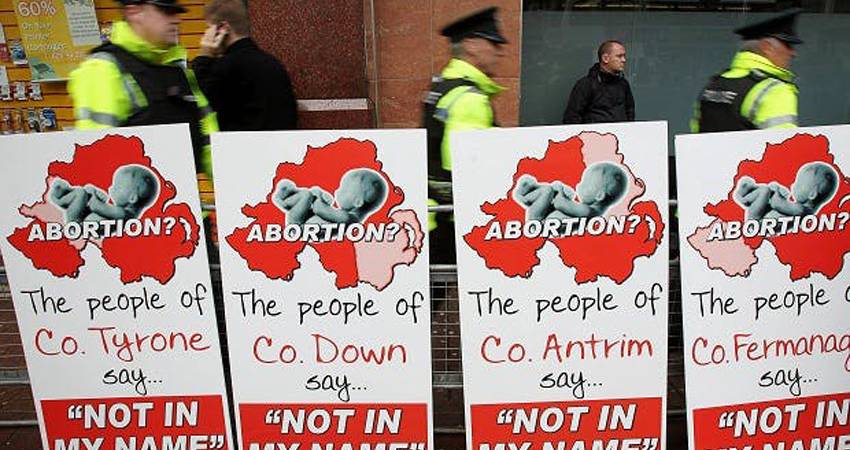
Why Looking to Northern Ireland Ignores the Reality of the 8th Being Repealed
On Sunday, an RTE presenter posited this question: “How can you say the 8th amendment is necessary to prevent a UK style abortion regime, when Northern Ireland has banned abortions for years without the 8th amendment?”
At its base we know that the experience of Ireland and Northern Ireland will diverge for a simple reason – our politicians have been kind enough to tell us their intentions as to what they would like to see happening should the 8th be replaced, and what they want is the implementation of the recommendations of the Citizens’ Assembly and the Joint Committee on the Eight Amendment. Those recommendations are already even more liberal than what Britain has, and numerous Ministers, the Taoiseach, and the leader of the opposition, have already came out to say they support the proposals put forward by those bodies.
On a technical level, Northern Ireland has a deeply unusual political system, which is why the 1967 Abortion Act never applied to the jurisdiction. Abortion policy was only devolved to the Northern Irish Assembly in 2010, which means that even if people of Northern Ireland had wanted to liberalise their abortion laws they have had relatively little time to actually do so since it was the purview of Westminster before that. There have been attempts to widen the availability of abortion within the Northern Irish Assembly since 2010, all of which were defeated, but there has absolutely been a push towards wider abortion laws since the devolution of the abortion laws to the Assembly. Two of the biggest political parties, the DUP and SDLP have resisted attempts to liberalise the laws, although again there have been multiple attempts to do so over the past number of years, often with the support of Sinn Féin.
In Northern Ireland however, even if the assembly had enough raw votes to bring in wider access to abortion, there exists a mechanism called ‘petitions of concern’ which effectively means that any 30 members of the assembly can force a vote to require 60% of all MLAs, and 40% of both nationalist and unionist MLAs, to vote for a proposal in order to allow it to pass instead of merely a straight majority vote; this mechanism was used 115 times between 2011 and 2016. This mechanism exists due to the unique circumstances within Northern Ireland, and highlights how unusual their democratic system is, as it is designed to prevent a return to violence over nearly anything else.
At its core the reason that Northern Ireland has the abortion regime it does, and the reason that Ireland will end up with a far more liberal one, is political rather than cultural or legal. In Northern Ireland, political parties do not support more liberal abortion laws, in Ireland the vast majority of political parties do.
Ergo once the matter is given to those political parties they will act to liberalise it, as they have openly said they would do. In fact, some TDs such as Ruth Coppinger and others have stated that they seek abortion on demand legalised without term limits and they see the 12-week proposal as a ‘minimum’ requirement.
So, given that the reasons that Northern Ireland has avoided the British abortion system are due to its political parties, and given that most Irish political parties have explicitly said that they support the recommendations put to them by the CA and Joint Committee, we can safely say we know that Ireland will not move to the regime in the north, but will instead move towards a system which is, in many ways, more liberal than the British one.
Patrick Clarke is a researcher and writer
Featured
- Abortion coercion has arrived in Ireland – the NWC are silent
- Review of at-home abortions 'needed after coercion case'
- French Govt to remind 29-year-olds of biological clock
- Huge factor in decline in primary school numbers ignored
- Germany Denies Promoting Abortion Abroad—While Funding Pro-Abortion NGOs
- Govt don’t oppose Coppinger abortion bill at 1st stage
- March for Life: Vance, the White House, and a Divided Pro-Life Movement
- Paris’ Annual March for Life Puts Euthanasia in the Spotlight
- Britain’s seemingly limitless abortion rate
- The importance of the work carried out by Every Life Counts
- Puerto Rico officially recognizes unborn children as ‘natural persons’
- Assisted suicide laws stalled by “complex” legal issues
- Yes, that hideous celebration of 300 abortions is real
- White Crosses Memorial: Dungarvan once again pays its respects to our aborted babies
- Josiah: Abortion Survivor
- Rally for Life 2025


























